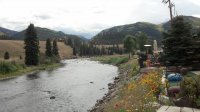- Posts: 3975
- Thank you received: 14
New Boat Tax for Evergreen Lake
- Photo-fish
-

- Mountain Legend
-

Ecological Impacts - Zebra mussels have disrupted the traditional aquatic food chains of many inland lakes. Regardless of their size, inland lakes represent unique ecological systems. When zebra mussels enter into these fragile systems, their voracious filter feeding depletes the availability of microscopic organisms that play a critical part in each lake's ecological food web. As a result, valued sportfish are impacted. Zebra mussels consume considerable amounts of these beneficial microscopic organisms and this creates less food for larval and juvenile fishes that support sport and commercial fisheries. But hey, you get crystal clear water.
Biological Impacts - Zebra mussels are similar to other mussel species because they attach themselves to hard surfaces. However, unlike other species, zebra mussels will readily attach themselves to native mussels. This behavior is known as bio-fouling and with the spread of zebra mussels, native mussel populations have been severely reduced. Some native mussels are more tolerant than others, but even for these resistant species, becoming covered by zebra mussels makes them more vulnerable to environmental stressors, such as extreme water temperatures, lack of food, or parasites and disease. As zebra mussels spread, biologists are concerned that populations of native mussels will decline, and perhaps some of the rarer species may be completely eliminated.
Economic Impacts - The zebra mussel attaches to hard surfaces located at moderate depths. This affinity for hard surfaces has made water intake structures, like those used for power and municipal water treatment plants, susceptible to colonization. Since 1989, some plants located in areas of extensive zebra mussel colonization have reported significant reductions in pumping capabilities and occasional shutdowns.
Human Health Impacts – As significant filter feeders, zebra mussels may increase human and wildlife exposure to organic pollutants (PCBs and PAHs). Early research shows that zebra mussels can rapidly accumulate organic pollutants within their tissues to levels more than 300,000 times greater than concentrations in the environment. They also deposit these pollutants in their pseudofeces. These contaminants can be passed up the food chain so that any fish or waterfowl consuming zebra mussels will also accumulate these organic pollutants. Likewise, human consumption of these same fish and waterfowl could result in further risk of exposure.
The potential for zebra mussels to spread is very high. In fact, several bills are in front of Congress that focus on preventing the westward spread of zebra mussels. These hitchhikers can spread to other inland waters either in their immature form known as veligers transported in water or as adults attached to boat hulls, engines, aquatic weeds, trailers, anchors, waders or other surfaces. Veligers are small-about the size of the period at the end of this sentence-and may be able to survive in any residual water source.
Adult mussels are very hardy and can survive out of water for extended periods depending upon temperature, humidity, wind, and sunlight. Maximum out-of-water survival time in ideal conditions is about 10 days for adults and 3 days for newly-settled juveniles.
´¯`•.. ><((((º>`•´¯`•...¸><((((º> ´¯`•.. ><((((º>`´¯`•...¸><((((º>´¯`•.. ><((((º>`•´¯`•...¸><((((º> ´¯`•.. ><((((º>`•.´¯`•...¸><((((º>
Please Log in or Create an account to join the conversation.
- daisypusher
-

- Mountain Legend
-

- Posts: 847
- Thank you received: 0
Please Log in or Create an account to join the conversation.
- archer
-

- Mountain Legend
-

- Posts: 9964
- Thank you received: 8
Please Log in or Create an account to join the conversation.
- daisypusher
-

- Mountain Legend
-

- Posts: 847
- Thank you received: 0
I am not sure where you are on the political spectrum so I will throw both out:
How 'bout those illegal aliens?
How 'bout those hillbillies?
So Pigeon Hole me again.
Please Log in or Create an account to join the conversation.
- Photo-fish
-

- Mountain Legend
-

- Posts: 3975
- Thank you received: 14
The jury is still out, but the problems far out weigh any benefits in all that I have read so far.
´¯`•.. ><((((º>`•´¯`•...¸><((((º> ´¯`•.. ><((((º>`´¯`•...¸><((((º>´¯`•.. ><((((º>`•´¯`•...¸><((((º> ´¯`•.. ><((((º>`•.´¯`•...¸><((((º>
Please Log in or Create an account to join the conversation.
- Photo-fish
-

- Mountain Legend
-

- Posts: 3975
- Thank you received: 14
http://www.lcni5.com/cgi-bin/c2.cgi?036+article+News+20100629160756036036009
The inspections are free but mandatory, and are available during business hours seven days a week, as part of a statewide mandatory testing program now in effect.
The fees will seem new to many Evergreen residents this year, because the district hasn't charged for boating for the last eight or nine years. A boating fee was in effect when the Lake House was first built and until about 2001.
Boaters who pull up to a lake and knowingly bring in a boat from a body of water such as Lake Granby and sneak on the Evergreen Lake without inspection are subject to a $1,500 fine and possible jail time.
´¯`•.. ><((((º>`•´¯`•...¸><((((º> ´¯`•.. ><((((º>`´¯`•...¸><((((º>´¯`•.. ><((((º>`•´¯`•...¸><((((º> ´¯`•.. ><((((º>`•.´¯`•...¸><((((º>
Please Log in or Create an account to join the conversation.
- BearMtnHIB
-
 Topic Author
Topic Author
- Mountain Legend
-

- Posts: 2464
- Thank you received: 0
A person can support keeping Zebra mussels out of Evergreen lake, be against a $4 fee, not be short sighted, be willing to pay for preservation and resident recreation - all at the same time. Yes - ALL at the same time! And even have additional qualities/characteristics on the side.
I agree. Everyone in the district has been supporting evergreen lake with the Rec district mill levy on their property taxes. I have personally paid thousands to the district - and while I have said that I am not opposed to testing - I am opposed to additionally taxing my kayak. The use of my kayak on the lake 6 to 8 times a year and walking around the lake are the only benefits I have ever received from the district. Now they want more of my money - and I think I have paid more than enough already.
Would any of you pay $380 per year for the use of a kayak on the lake and the dirt trail to walk around the lake - because that's the price I pay now. I don't think it's short sighted to insist that I already pay enough.
Please Log in or Create an account to join the conversation.
- Wayne Harrison
-

- Mountain Legend
-

- Posts: 6722
- Thank you received: 72
But under your reasoning, you should get into the pool at no additional charge, since you already paid $380 per year to the rec district. And yet people pay that fee all the time. Under your reasoning, you should be able to ride RTD buses for free because you already pay RTD taxes?
Please Log in or Create an account to join the conversation.
- BearMtnHIB
-
 Topic Author
Topic Author
- Mountain Legend
-

- Posts: 2464
- Thank you received: 0
Please Log in or Create an account to join the conversation.
- archer
-

- Mountain Legend
-

- Posts: 9964
- Thank you received: 8
daisypusher wrote: Even more non sequitur than before. A person can support keeping Zebra mussels out of Evergreen lake, be against a $4 fee, not be short sighted, be willing to pay for preservation and resident recreation - all at the same time. Yes - ALL at the same time! And even have additional qualities/characteristics on the side.
I am not sure where you are on the political spectrum so I will throw both out:
How 'bout those illegal aliens?
How 'bout those hillbillies?
So Pigeon Hole me again.
My post was not directed at you specifically, though I am not surprised you took it that way.
FYI....I'm against illegal aliens, including mussels, and have no opinion on hillbillies. I did not pigeon hole you, you took it upon yourself to do that in your response.
What I am for is careful protection of Evergreen Lake, it is a wonderful asset to our community.
Please Log in or Create an account to join the conversation.






